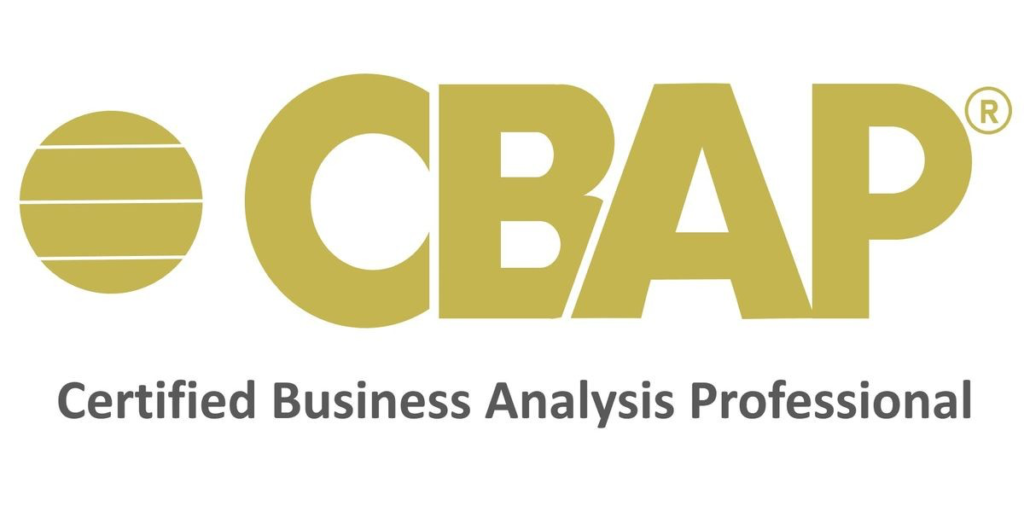Certified Business Analysis Professionals (CBAP) from IIBA
course Overview
Course duration: 40 hours
The Certified Business Analysis Professionals (CBAP) course is designed to help business analysts in gaining a comprehensive understanding of Business Analysis frameworks, processes, and related practices. It covers a variety of tools and techniques for gathering, understanding, and communicating requirements to identify potential solutions for complex business problems.
The course also focuses on developing critical skills such as facilitating meetings, documenting requirements, and managing stakeholder relationships. The course is divided into a series of modules teaching students the fundamentals of Business Analysis. It covers topics such as:
- Fundamentals of Business Analysis
- Understanding Requirements
- Modeling & Analysis Techniques
- Managing Requirements & Stakeholders
- Innovative Solutions & Approaches
- Project Lifecycle & Software Development Process
- Quality Assurance & Testing
The course provides the opportunity to become a certified Business Analyst – a prestigious industry certification that is highly sought after by employers. With this certification, employers know that the candidate has the necessary knowledge, skills, and abilities to effectively analyze a solution to a business problem. The CBAP certification is essential for career progression and advancement in this specific field.

Course Curriculum
- Purpose of the BABOK® Guide
- What is Business Analysis?
- Who is a Business Analyst?
- Structure of the BABOK® Guide
- The Business Analysis Core Concept Model™
- Key Terms
- Requirements Classification Schema
- Stakeholders
- Requirements and Designs
- Plan Business Analysis Approach
- Plan Stakeholder Engagement
- Plan Business Analysis Governance
- Plan Business Analysis Information Management
- Identify Business Analysis Performance Improvements
- Prepare for Elicitation
- Conduct Elicitation
- Confirm Elicitation Results
- Communicate Business Analysis Information
- Manage Stakeholder Collaboration
- Trace Requirements
- Maintain Requirements
- Prioritize Requirements
- Assess Requirements Changes
- Approve Requirements
- Analyze Current State
- Define Future State
- Assess Risks
- Define Change Strategy
- Specify and Model Requirements
- Verify Requirements
- Validate Requirements
- Define Requirements Architecture
- Define Design Options
- Analyze Potential Value and Recommend Solution
- Measure Solution Performance
- Analyze Performance Measures
- Assess Solution Limitations
- Assess Enterprise Limitations
- Recommend Actions to Increase Solution Value
- Analytical Thinking and Problem Solving
- Behavioral Characteristics
- Business Knowledge
- Communication Skills
- Interaction Skills
- Tools and Technology
- Acceptance and Evaluation Criteria
- Backlog Management
- Balanced Scorecard
- Benchmarking and Market Analysis
- Brainstorming
- Business Capability Analysis
- Business Cases
- Business Model Canvas
- Business Rules Analysis
- Collaborative Games
- Concept Modelling
- Data Dictionary
- Data Flow Diagrams
- Data Mining
- Data Modelling
- Decision Analysis
- Decision Modelling
- Document Analysis
- Estimation
- Financial Analysis
- Focus Groups
- Functional Decomposition
- Glossary
- Interface Analysis
- Interviews
- Item Tracking
- Lessons Learned
- Metrics and Key Performance Indicators (KPIs)
- Mind Mapping
- Non-Functional Requirements Analysis
- Observation
- Organizational Modelling
- Prioritization
- Process Analysis
- Process Modelling
- Prototyping
- Reviews
- Risk Analysis and Management
- Roles and Permissions Matrix
- Root Cause Analysis
- Scope Modelling
- Sequence Diagrams
- Stakeholder List, Map, or Personas
- State Modelling
- Survey or Questionnaire
- SWOT Analysis
- Use Cases and Scenarios
- User Stories
- Vendor Assessment
- Workshops
- The Agile Perspective
- The Business Intelligence Perspective
- The Information Technology Perspective
- The Business Architecture Perspective
- The Business Process Management Perspective
Ready to enroll in the course?
Course Prerequisites
1. Candidates must have a minimum of seven (7) years of professional business analysis experience.
2. Candidates must have at least 900 hours of experience in four (4) out of six specified knowledge areas for BABOK:
- Business Analysis Planning and Monitoring
- Enterprise Analysis
- Requirements Elicitation
- Requirements Analysis and Documentation
- Requirements Management and Communication
- Solution Evaluation
3. Candidates must have experience in at least two (2) of the following tasks:
- Communicating with stakeholders to identify and validate business needs, expectations and requirements
- Analyzing business models to identify gaps and opportunities
- Creating and validating requirements documents such as business process models, requirements documents and user stories
- Applying critical thinking and problem-solving skills to identify robust solutions
- Establishing, tracking and reporting on business analysis metrics
- Evaluating feasible solutions and collaborating with stakeholders to develop and implement agreed-upon plans
4. Candidates must successfully pass the IIBA CBAP® Written Examination (Instruction and Certification preparation course recommended).
Target Audience
Certified Business Analysis Professionals (CBAP) training is ideally suited for business analysts, project managers, and consultants who want to start or accelerate a career in business analysis. This training is geared towards professionals with 5 years or more of relevant work experience. The targeted audience for this training would include business analysts, process improvement consultants, systems analysts, informational designers, project managers, software developers, and other IT professionals with sufficient understanding of business analysis principles
At a minimum, students would need to have a strong understanding of the fundamentals of business analysis and project management in order to benefit from this training. They must also have the ability to effectively communicate their findings and project plans with other stakeholders. Additionally, those wishing to benefit from the CBAP training must demonstrate an understanding of requirements elicitation and project scope definition
Those with previous experience in process analysis and refinement can get the most out of this program. Ultimately, CBAP training is appropriate for professionals with a desire to develop a long-term career in business analysis
Learning Objectives of Certified Business Analysis Professionals (CBAP)
The Certified Business Analysis Professional (CBAP) Training is designed to equip business analysts with the knowledge and skills required to identify, analyze, document and manage requirements based on the knowledge areas and techniques used by the global business analysis community. Training objectives include:
- Understanding the concept of business analysis and the processes involved.
- Understanding the different techniques used in the requirements process and how to apply them.
- Developing a practical understanding of the techniques used to define and analyze complex business requirements.
- Becoming adept with software development models, techniques and tools for modeling requirements
- Educating participants about the effective ways to manage stakeholders and requirements challenges.
- Enhancing the skills required to manage and negotiate changes to requirements.
- Developing expertise in the monitoring, measuring and communicating progress and achievement of the business needs.
- Maximizing the deliverables of a successful project.
